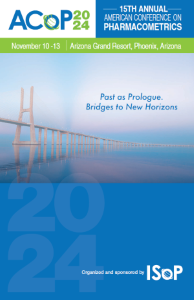Integration of modelling, endogenous biomarkers, and real-world study approaches to support precision dosing in special populations
Estimation of FMO3 Ontogeny by Mechanistic Population Pharmacokinetic Modelling of Risdiplam and Its Impact on Drug–Drug Interactions in Children
Monday, November 11, 2024
3:25 PM – 3:50 PM MST
Location: Sonoran Sky Ballroom 5 - 8

Michael Gertz, PhD (he/him/his)
Expert Scientist
F. Hoffmann-La RocheDisclosure(s): Roche: Employment (Ongoing)
Speaker(s)
Disclosure(s):
Michael Gertz, PhD: Roche: Employment (Ongoing)
The FMO3 ontogeny is critical input data for the prediction of risdiplam pharmacokinetics (PK) in children, it was mostly studied in vitro, and robust in vivo FMO3 ontogeny is currently lacking. Population and physiologically based PK (PPK and PBPK) modelling conducted during the development of risdiplam were integrated into a mechanistic PPK (Mech-PPK) model to estimate in vivo FMO3 ontogeny. Impact of the newly estimated FMO3 ontogeny on predictions of drug-drug interaction (DDI) in children was investigated by simulations. Mech-PPK modelling successfully estimated in vivo FMO3 ontogeny from risdiplam data collected from 525 subjects aged 2 months-61 years with an approximately threefold difference. The simulations of theoretical dual CYP3A-FMO3 substrates predicted comparable or decreased CYP3A-victim DDI propensity in children compared to adults across the range of fm values. Refinement of FMO3 ontogeny in the risdiplam model had no impact on the previously predicted low CYP3A-victim or -perpetrator DDI risk of risdiplam in children. Derivation of a robust in vivo FMO3 ontogeny function has significant implications on the prospective prediction of PK and DDI in children for other FMO3 substrates in the future, as illustrated in the current study for FMO3 and/or dual CYP3A-FMO3 substrates. The speaker will also summarize the current challenge to uncover enzyme or transporter ontogeny for age-related specific populations and show their perspectives from biopharma side.

